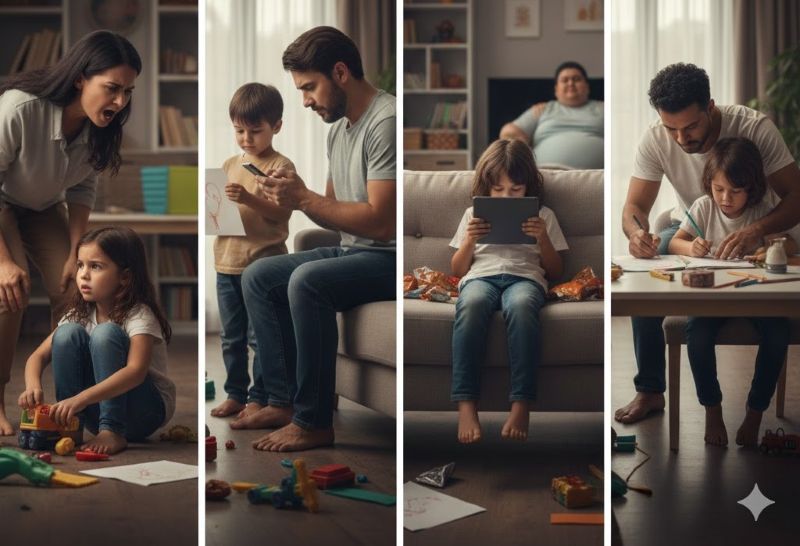
Common Parenting Myths Busted by Experts
March 25, 2025
How to Raise Resilient Kids Who Can Handle Life’s Ups and Downs
March 25, 2025Your child’s happiness depends on more than just daily routines. The way you guide and communicate shapes their inner world. Parenting style is key to child happiness, not just about rules.
Every interaction, from bedtime talks to handling tantrums, affects the parent-child bond. Families do well when care and boundaries are balanced. What if small changes in parenting could make your family happier? The first step is to be curious, not critical.
Science says kids reflect their home’s emotional climate. A nurturing style helps them be resilient. But aiming for perfection isn’t the goal. Even small changes in how you talk or stay patient can bring joy.
Every parent’s biggest strength is being aware. Knowing how you parent can lead to stronger bonds and brighter futures.
Key Takeaways
- Parenting style directly influences child happiness through daily interactions and emotional support.
- Healthy parent-child relationships depend on balancing guidance with warmth.
- Family wellbeing improves when parents prioritize self-awareness over rigid rules.
- Small, consistent changes in parenting strategies can lead to lasting positive outcomes.
- Authentic connection—not perfection—builds secure, happy children.
The Profound Impact of Parenting Styles on Child Development
Every smile, reprimand, and bedtime story leaves a mark on a child’s mind. Child development research shows these moments shape core beliefs about trust, worth, and the world. The ways parents guide, comfort, or set limits—parenting approaches—act as blueprints for how children navigate emotions and relationships later in life.
How Children Internalize Parenting Approaches
During early childhood development, kids absorb parental behavior like sponges. A Harvard study found that by age three, children already mirror their caregivers’ communication styles. “A child who hears ‘You can’t do that’ may grow up doubting their abilities,” says Dr. Sarah James, a child psychologist. These early interactions form neural pathways that influence self-esteem and problem-solving skills.
The Long-term Effects of Early Parenting Experiences
Research in child development journals reveals lasting impacts: children raised with consistent warmth and boundaries are 34% more likely to report life satisfaction as adults. On the other hand, inconsistent parenting correlates with higher anxiety rates. These patterns aren’t just habits—they’re the foundation for future social skills and resilience.
Why Your Daily Interactions Matter More Than You Think
Daily parent interactions—like sharing meals, solving conflicts calmly, or celebrating small wins—act as daily “brain workouts.” Consider these key moments:
- Bedtime conversations build emotional vocabulary
- Handling tantrums with empathy teaches conflict resolution
- Encouraging choices fosters decision-making confidence
These routines aren’t just routine—they’re shaping a child’s inner dialogue. Every moment is an opportunity to nurture resilience and joy, proving small, intentional acts today lay the groundwork for thriving tomorrow.
Understanding the Four Main Parenting Styles
Parenting styles shape how kids see the world. Psychologists have found four main ways parents raise their children. Each style affects a child’s behavior, confidence, and emotional health in different ways.
Authoritarian Parenting: High Demands with Low Responsiveness
Authoritarian parents set strict rules with little room for change. They might say, “Clean your room now—no questions allowed.” Kids learn to follow rules but might struggle with making their own decisions later.
- Key traits: Punitive consequences, rigid schedules
- Example: Grounding a child for months without discussion
Permissive Parenting: High Warmth with Few Boundaries
Permissive parents focus on love over rules. They might say, “It’s okay, just this once.” While kids feel loved, they might have trouble with self-control.
Authoritative Parenting: Balanced Guidance with Emotional Support
Authoritative parents set clear rules and offer emotional support. They might say, “We’ll finish homework first, then you can play.” This style is linked to kids doing well in school and being resilient.
Uninvolved Parenting: Low Engagement Across All Dimensions
Uninvolved parents don’t get involved much. If they miss school meetings without explanation, kids might feel ignored. This can hurt their sense of security.
| Style | Key Traits | Example | Common Outcome |
|---|---|---|---|
| Authoritarian | Strict rules, no negotiation | Grounded for minor mistakes | Low self-esteem |
| Permissive | Flexible rules, high indulgence | Skipping homework to play games | Difficulty with limits |
| Authoritative | Clear rules + emotional support | Setting screen time limits together | Strong problem-solving skills |
| Uninvolved | Lack of communication or rules | No check-ins about school struggles | Emotional detachment |
Knowing about these parenting styles is the first step to growing as a parent. Each style has good points and areas to work on. Starting with awareness can lead to positive changes.
Warning Signs Your Parenting Style May Be Causing Unhappiness
Every child’s behavior tells us something about their feelings. Spotting parenting red flags means paying attention. Signs like sudden withdrawal or outbursts might show deeper issues. These signs are not attacks but chances to connect again.
Here are some common unhappy child signs:
- Emotional extremes: Sudden shifts from defiance to tears
- Physical complaints: Frequent stomachaches without medical cause
- People-pleasing: Overly compliant behavior to avoid conflict
Physical changes can show emotional struggles. If your child’s sleep or appetite changes a lot, it’s a sign. These aren’t just “phase” symptoms—they’re child emotional health warnings.
“Children’s behaviors are cries for understanding, not failures of parenting,” says Dr. Sarah Anderson, child psychologist and author of Raising Resilient Souls. “Recognizing these signs early builds bridges, not walls.”
Seeing negative parenting effects isn’t about fault. It’s about noticing patterns. Do arguments often end in silence? Does your child avoid eye contact? These moments ask for deeper listening. Every red flag is a chance to show empathy. Small changes can turn distress into trust, building resilience instead of resentment.
The Science Behind Parenting Style and Emotional Wellbeing
For decades, parenting science and childhood psychology have shown how parents shape their kids’ inner worlds. Recent brain development research has found that caring interactions change the brain’s structure. This affects a child’s emotional health for their whole life.
Research on Childhood Happiness and Parenting Approaches
A 2022 study in the Journal of Child Psychology found a big difference in child emotional wellbeing. Kids with authoritative parents, who are both warm and set clear rules, were 30% happier. The study showed:
- Authoritative parenting helps with stress and social skills
- Permissive parenting can lead to more anxiety in preteens
- Authoritarian parenting can lower creativity and self-esteem
How Parenting Shapes the Brain
Neuroscientists at Stanford found that loving interactions boost the brain’s emotional control center. Secure attachment, from consistent care, makes kids more empathetic and resilient. Dr. Deborah Carter, leading the ABC Study, said:
“Warm guidance doesn’t just influence behavior—it builds the brain’s wiring for lifelong emotional stability.”
Roots of Future Relationships
Childhood psychology shows early interactions shape our mental models. Kids who feel heard and seen tend to trust others. Those who feel neglected may find it hard to form close bonds. This affects everything from friendships to romantic relationships, showing parenting’s lasting impact.
These findings are more than just data. They’re tools for changing lives. Every hug, talk, and rule set today builds the foundation for tomorrow’s confident, connected adults.
Transforming Your Approach: Finding Your Authentic Parenting Style
“The greatest gift you can give your child is a parent who is thoughtful, intentional, and growing.”
Every parent’s journey starts with knowing where they are today. Begin by watching how you interact with your child. Do you follow strict rules or are you more flexible? Reflecting on how you handle challenges is key to authentic parenting.
Writing down your thoughts or looking back at past choices can help you see patterns. These patterns shape how you parent.
Identifying Your Current Patterns and Tendencies
Start with these steps:
- Track decisions: Note times you enforce rules or bend them.
- Identify triggers: What situations make you react impulsively?
- Ask for feedback: Trusted friends or partners often see patterns you miss.
Blending Different Approaches for Your Unique Child
A personalized parenting approach means mixing styles that fit your child’s needs. For example, a child who worries might do well with a routine (authoritative) and understanding (permissive). Don’t stick to one style too tightly.
Making Gradual Changes That Last
Changing how you parent isn’t about quick fixes. Here’s a plan for sustainable parenting changes:
| Step | Action | Benefit |
|---|---|---|
| 1 | Choose 1 habit to adjust weekly (e.g., active listening) | Builds consistency without overwhelm |
| 2 | Reassess monthly with child’s feedback | Ensures adaptability to growth phases |
| 3 | Share goals with a support group | Accountability strengthens new habits |
Every small change brings you closer to a parenting style that feels right for you and your child. It’s about progress, not being perfect.
Building Stronger Connections Through Mindful Communication
Mindful parenting focuses on understanding, not judging. It starts with active listening, turning daily talks into special moments. By really listening to their child, parents build trust. This trust strengthens the bond within the family. Here’s how to start:
- Pause distractions: Put away phones and make eye contact to show presence.
- Reflect feelings: Say, “It sounds like you’re frustrated,” to validate emotions.
- Ask open questions: “Can you tell me more about how that made you feel?” invites deeper sharing.
| Old Habit | Mindful Shift |
|---|---|
| Interrupting to solve problems | Listen first; offer guidance later |
| Ignoring nonverbal cues | Notice body language and tone as part of the message |
| “Just calm down!” | “I see you’re upset. Let’s breathe together.” |
“Children who feel heard become adults who trust their voices.”
Nonverbal cues are key: A smile, a touch, or a calm voice can solve issues before they grow. Mindful parenting is about being present in small moments. By listening actively, parents teach children to value their feelings and those of others. This builds empathy and strengthens family bonds for a lifetime.
Nurturing Emotional Intelligence in Your Family Dynamic
Emotional intelligence parenting is more than a trend. It’s a key to raising kids who are resilient and empathetic. By focusing on family emotional health, parents can turn everyday moments into chances for growth. Begin by teaching kids to identify their feelings.
A simple way? Use feeling charts or games. Kids can match faces to words like “frustrated” or “excited.”
Teaching Children to Recognize and Express Feelings
- Ask, “Your face looks worried—want to talk about it?” to help them speak up.
- Act out scenarios (like sharing toys) to teach teaching children emotions through play.
- Let kids know it’s okay to feel any emotion by saying, “It’s okay to feel this way.”
Modeling Healthy Emotional Regulation
Your reactions set the mood. When you’re stressed, say, “I’m feeling overwhelmed. Let me take deep breaths.” This shows emotional regulation skills in action. Studies show kids learn from what parents do, making this a great teaching moment.
“Kids learn more from what you do than what you say.”
Creating Safe Spaces for Vulnerability
- Have weekly “feelings check-ins” where everyone shares one emotion they felt that day.
- Be supportive without judging: “I hear you’re sad about that. Let’s see how we can help.”
- Share family stories to show how even adults face challenges—but keep trying.
Building these habits makes your home a place for learning empathy. When kids see adults manage stress well, they learn valuable skills. These small steps today can lead to a future filled with emotional intelligence for generations.
Establishing Loving Boundaries Without Harsh Discipline
Children do best when they know what to expect. But strict rules can make things tough. Loving boundaries mix clear rules with kindness. This way, kids learn to trust and understand themselves better.
The Difference Between Punishment and Natural Consequences
Punishment can push kids away; natural consequences teach them. For example, if a kid doesn’t wear a coat, they might get cold. This teaches them about responsibility in a gentle way.
Studies show positive discipline cuts down on fights by 40% compared to strict rules (Journal of Family Psychology, 2022).
- Punishment: Shames behavior, damages trust
- Natural consequences: Allow learning through experience
Consistency as the Foundation of Security
Consistent parenting means rules are fair, not strict. A study in Child Development (2021) found that regular routines cut down on anxiety in kids by 35%. Simple things like morning lists or bedtime routines help without taking away freedom.
- Set 1-2 core rules instead of micromanaging
- Use calm, matter-of-fact language during corrections
Maintaining Boundaries While Preserving Connection
“Boundaries are love in action—they show we care enough to guide,” says Dr. Laura Markham, founder of Aha! Parenting.
When setting limits, get down to their level and explain, “I see you’re upset, but our rule is…” This shows you get their feelings and respect their needs. Kids learn that rules mean safety, not that you don’t love them.
Adapting Your Parenting Style as Children Grow
Parenting is not a one-size-fits-all journey. As children grow, evolving parenting becomes key. What worked for a toddler won’t do for a teen wanting freedom. Parenting flexibility means growing with them, not against them.
“The best parenting adapts like a river—strong but fluid.” — Dr. Elena Martinez, child development researcher
Infancy needs constant care, while adolescence calls for age-appropriate parenting. This balance guides while giving space. Here’s how to adjust:
- Infancy (0-2): Focus on safety and trust through consistent care.
- School years (3-12): Teach problem-solving with clear rules.
- Adolescence (13+): Support decision-making with advice, not orders.
Look out for signs like clinginess or rebellion. These often mean you need to adjust. Change how you talk to them—listen more and trust their growing skills. Being flexible shows you’re committed to their changing needs.
See parenting flexibility as a strength. Each stage is a chance to grow closer. By adapting to their world, you help them and yourself grow. Parenting that evolves with them builds resilience and confidence for both of you.
Breaking Generational Patterns: Healing Your Own Childhood Wounds
Every parent starts by understanding how the past affects today. Generational trauma and family patterns shape our choices. Healing begins by acknowledging this legacy and choosing to change it.
“To break cycles, we must first see them.”
Begin by looking at how your upbringing influences you now. Ask yourself: Do my reactions mirror my parents’? Are my expectations tied to childhood lessons? Writing in a journal or talking to a therapist can help reveal hidden patterns that influence your parenting.
Step 1: Identify the Roots
- Track moments of frustration—do they echo old family dynamics?
- Reflect on traditions or rules rooted in your own childhood
- Notice how you handle conflict compared to your caregivers
Step 2: Pause Before Reacting
Parenting triggers often surface when stress peaks. When emotions rise, practice:
- Stopping to breathe before responding
- Asking, “Is this my child’s need, or my old wound?”
- Replacing automatic reactions with intentional choices
Step 3: Create New Narratives
Building a new family legacy means:
- Sharing your healing journey with your children
- Replacing shame with stories of resilience
- Establishing rituals that reflect your values, not just old habits
This work isn’t about being perfect—it’s about making progress. By addressing generational trauma, parents create homes where love triumphs over inherited pain. Every step toward healing gives children a brighter future.
Embracing the Journey: Every Parent Has the Power to Foster Happiness
Parenting is not about being perfect. It’s a journey where small steps lead to big changes. By being a guide, not a flawless authority, you can help your child find happiness. Dr. Diana Baumrind says that balanced parenting builds resilience. The key is to be consistent in love and adaptable.
Creating a positive family culture starts with self-compassion. When you show your children that you’re always learning, you teach them the value of lifelong growth. Read books, join groups, or think about what works for your family. Every change you make strengthens your bond and teaches your kids to explore life with curiosity.
Children do well when they see their parents trying, failing, and trying again. Your efforts to talk openly, set fair rules, and stay present are more important than any rule. By being real and not perfect, you make your home a safe place for mistakes and learning.
Conscious parenting has a big impact beyond your family. By teaching your children to be emotionally aware, you help build a future filled with empathy and strong relationships. Every day is a chance to grow and learn. The joy comes from being kind to yourself and your children.




